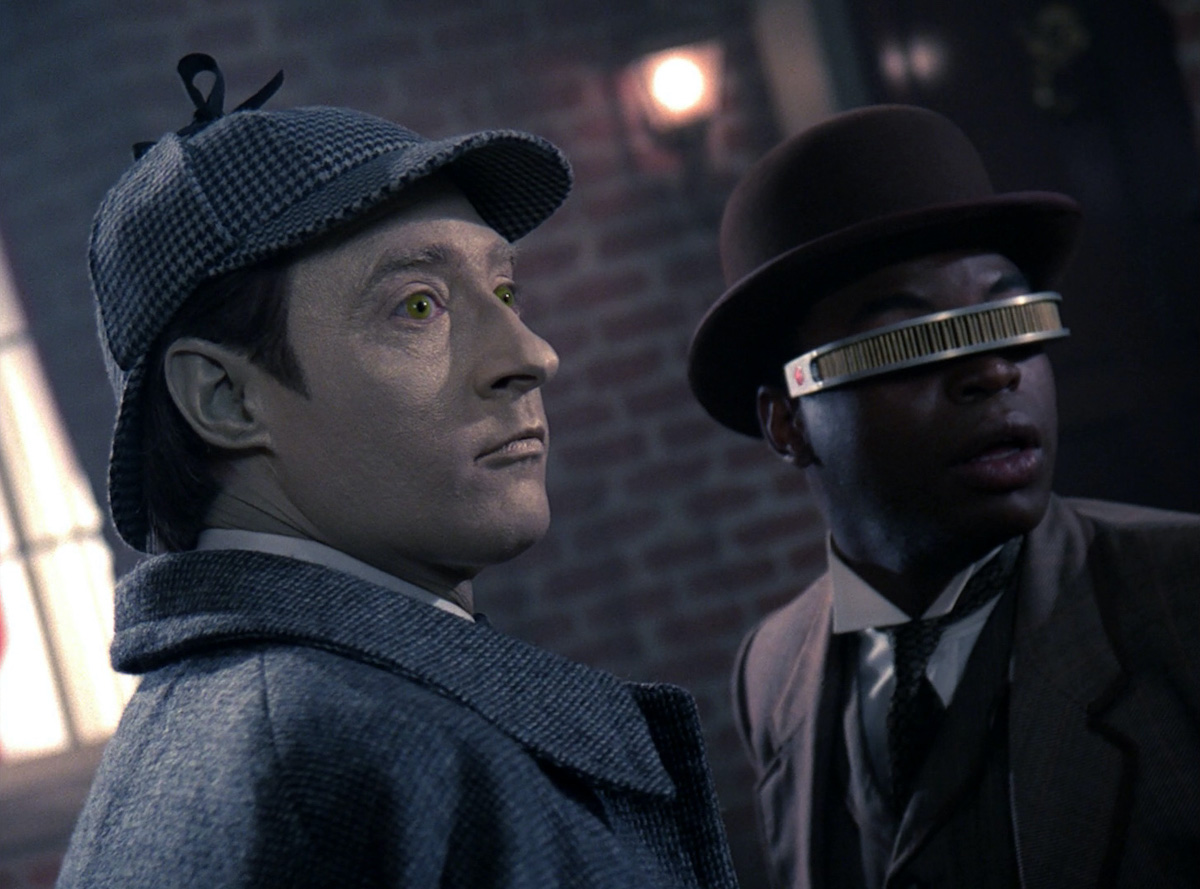“A great monstrous shape, on which I am like a fly stuck on a turtle’s back, adrift in a great emptiness.”
I suppose the holodeck episodes of Star Trek: The Next Generation don’t really do it for me – which is odd, because on basic terms, I love the setup, especially as it’s applied here. The Enterprise arrives three days early for a rendezvous, and with nothing very important to do aboard ship, Geordi and Data disappear into the holodeck to kill some hours playing Sherlock Holmes. It’s one of the strengths of the series and of the holodeck conceit itself that we could, in this science fiction / fantasy world, leave real-world matters of great import aside for an episode or two, and follow our lead characters as they live out their fantasy lives in impossibly tangible terms. What a rich opportunity to refract and reflect the principal cast, in a manner rarely explored in dramatic television. It causes one to wonder about the larger context of fantasy as a whole in a society that has such marvelous tools to make fantasy real. But, as Moriarty puns in “Elementary, Dear Data,” it’s all ultimately no matter. For all the conceptual juice that seems to be locked up in the holodeck idea, I don’t feel like any Star Trek series really got to the bottom of the thing. Next Gen bravely tackled one or two of these holodeck episodes per year for the entire run of the show, of which “Elementary, Dear Data” is one of the most famous, but as with “The Big Goodbye” the year before, it never convincingly “gets there.”
I have to assume “Elementary” was my first real exposure to Sherlock Holmes. I would have been twelve at the time. Certainly, Data in his funny hat and Daniel Davis as the man that “Holmes could only defeat at the cost of his own life at Reichenbach Falls” dominated my internal perception of Conan Doyle for many, many years. The episode – whose budget and scale was so gargantuan that they more than explain the bottle episode, “Where Silence Has Lease,” which preceded it – is tons of fun for the first half, as Geordi, Data and Dr. Pulaski get into deeper and deeper attempts to create a Holmesian holodeck mystery that can honestly confound Data. The trouble is that the second half of the episode feels muddled and incomplete, arriving at the creation of the Moriarty character and then never really figuring out what to do with him – including the ending, where (in the great tradition of James T. Kirk, I should point out) Picard essentially talks the villain into amicable suicide. Not very dramatic.
In Moriarty, Next Gen (and Star Trek as a whole) has its first kick at an idea that would vex the franchise for years and years to come, even resulting in a full member of the crew on Star Trek: Voyager. The idea is this: say you can conjure these holographic fantasy worlds with perfect simulations of people within them; what are the people, then? Moriarty is given a shot in the sentience arm by a slip of the tongue in his programming (this seems incredible – given that I’m given a warning/confirmation request if I attempt to delete a tweet, do we really think that the Enterprise computer would proceed with the Moriarty program without at least asking Geordi, “Are you sure you want to create life – y/n?”), but the justification of Moriarty’s ascension to a higher plane of consciousness almost seems like an excuse. The more intriguing question, per Minuet in “11001001” the year before, is: if a holodeck character is a perfect simulation of a thinking human being, then what’s the difference?
There’s no good answer to that, really, and by the time Captain Janeway was eerily sidestepping all questions of the Doctor’s status as an individual ten years later on Star Trek: Voyager, it seemed like Star Trek had just written itself down a rabbit hole from which it could not reasonably emerge without painting all of its human characters as colossal assholes. We see a bit of the asshole here, as Picard delicately attempts to wrest control of his ship back from Moriarty, the first holographic man to realize he was a man. As the sixth-season episode “Ship in a Bottle” would detail a few years later, the crew of the Enterprise wasn’t particularly fussed about the issue of Moriarty’s sentience as soon as the holodeck crisis-of-the-week was resolved, and yet Data – Holmes himself – would come up for trial on that very same issue before the year was out, in “The Measure of a Man.” Where is the line of artificial intelligence drawn? Star Trek never found the answer, and maybe that’s why the holodeck episodes always end up feeling vaguely half-assed. Three Enterprises out of five.

Blogging The Next Generation runs every Tuesday as I work my way through every episode of Star Trek: The Next Generation on blu-ray. Season 2 is available now.
